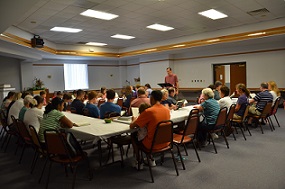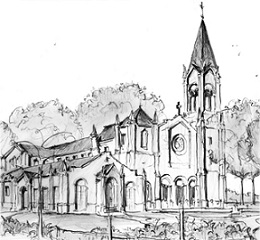 Â Â Â There is a kind of “spiritual terrorism” within the church today.
   There is a kind of “spiritual terrorism” within the church today.
It takes the form of unbiblical teaching, spreading false doctrine, and twisting Scripture.
It’s nothing new. Even in the Apostle Paul’s day there were false teachers like this.Â
Even within the influential church at Ephesus, there were corrupt elders who departed from the truth and had to be excommunicated from the church. The biblical response to unrepentant sin is clearly prescribed in Scripture.Â
“By rejecting this, some have made shipwreck of their faith, 20 among whom are Hymenaeus and Alexander, whom I have handed over to Satan that they may learn not to blaspheme.†[ESV]
These men were “handed over to Satan.” Let’s consider what this means.Â
First, the failure of these two men was rooted in their rejection of “a good conscience.â€
The plural in the New International Version’s “Some have rejected these†is misleading because the word “rejected†in the Greek refers to “a good conscience†as it’s only antecedent. It’s not referring to faith and a good conscience.
Hymenaeus and Alexander willfully and deliberately rejected their conscience. And by rejecting or violating their conscience by teaching what they knew to be error, they made shipwreck of the faith. So the former effected the latter.
The literal rendering here is they made shipwreck of not “their faith†in the subjective sense, but the faith in the objective sense. That’s a picture of spiritual terrorism.
We know that Hymenaeus was in error in his eschatology, of all things, because 2 Timothy 2:17, 18 mentions “Hymenaeus and Philetus, who have wandered away from the truth. They say that the resurrection has already taken place, and they destroy the faith of some.†So faith becomes the victim whenever false teaching goes unopposed.
Perhaps Alexander was also crazed by this “over-realized†eschatology. The point is, they wandered away from apostolic truth, which is biblical revelation — and it all began with the deliberate rejection of their conscience.
They knew something was wrong and they taught it anyway.
Yet Paul models for us the redemptive course for the faithful church to follow to the end. Verse 20 is a picture of church discipline for erring and unrepentant elders.
These men weren’t written off by the church. Rather, they were placed into a remedial situation so they would learn not to blaspheme. He says they are “Hymenaeus and Alexander, whom I have handed over to Satan that they may learn not to blaspheme.â€
This act of handing someone over to Satan in the NT context refers to excommunication; this is excommunication from the fellowship and influence of the church. This gives a sinning Christian no protection or solace from the assaults and devices of the enemy.
All church discipline presupposes an official registry of membership with each local church. The apostles or elders couldn’t put someone out of the church if they were never officially part of the church.
Neither apostles nor elders can excommunicate “non-communicate†people from the church. They didn’t put visitors out of the church. They didn’t remove guests from the church. That’s because guests and visitors aren’t under the charge of the church.
But neither are guests and visitors under the care of elders within that church; nor can they obey the NT command to submit to their overseers as non-members.
According to Luke’s history throughout the book of Acts, names were added to the list and numbers were counted as people were saved and baptized and names of the unrepentant were removed from the registry as discipline until they repented.
Paul forcefully removed Hymenaeus and Alexander from the church—away from God’s visible care and protection and thus under the power of Satan.
It was Paul’s intention that these sinning men be buffeted by Satan and that their separation from God and His people and the preaching of the Word in this way be brought home to them by their forced removal from the local church. Â
That may sound harsh and even brutal in our day where truth is treated so casually and the church is regarded by many as a sterile religious institution with no practical relevance for today. But Paul’s attitude was actually one of grace, severe grace.
Paul explained this redemptive process in a different circumstance in 2 Thessalonians 3:14-15, where he wrote:
“If anyone does not obey what we say in this letter, take note of that person, and have nothing to do with him, that he may be ashamed. 15 Do not regard him as an enemy, but warn him as a brother.†[ESV]
Our Lord taught in Matthew 18 that those who continue in sin are to be put out of the church. Such people who are excommunicated are delivered to Satan.
It is in this context of confronting a brother and putting a sinning member out of the church (binding and loosing) that Jesus said “For where two or three are gathered in My name, there am I among them.†It’s about Jesus’ presence in excommunication.
That doesn’t mean a true believer can forfeit their salvation; it means they become subject to the full assaults and terrors of the enemy while being deprived of fellowship for the purpose of bringing them to repentance. It’s to purify the church.
That is precisely what Paul called for in the Corinthian church (1 Cor. 5:4–5) and what he did to two of the false teachers in leadership at Ephesus, and what by implication he invites Timothy and us to continue to do. This is built into the church’s DNA.
To hand someone over to Satan indicates that they had not before been fully in his power while they remained in the church. The church is God’s protection for His flock.
In 1 John 5:19 we learn that “the whole world lies in the power of the evil one.â€
Unbelievers walk “according to the prince of the power of the air, of the spirit that is now working in the sons of disobedience†(Eph. 2:2).
Those who are to be delivered to Satan must, therefore, have been under the umbrella of protection provided by the church and the boundaries set by God’s Word.
Even unbelievers receive a certain amount of protection and blessing from their association with the community of redeemed people. That’s why Paul advised a believing spouse not to divorce an unbelieving spouse if they’re willing to stay.
The influence of blessing and protection for God’s own people overflows even to the unredeemed who externally oppose the truth and all that Christ offers.
Handing someone over to Satan removes the insulation and protection provided by the believing community. The unrepentant who are removed from the church are out from under God’s hand of blessing and they are fully under Satan’s influence.
There are times when, in the sovereign purpose of God, believers are turned over to Satan for positive purposes. There are several illustrations of this in the Scriptures.
This happened to Job. It happened to Simon Peter. And even the Lord Jesus Himself was turned over to Satan to prove His perfect obedience and character under fire.
As illustrated by these lives, God’s people can be handed over to Satan for positive purposes. It may be to show the genuineness of saving faith, or to keep them humble and dependent on God, or to enable them to strengthen others, or to offer praise to God. But in each case God receives the glory and His people are delivered.
However, there is another category of people delivered to Satan. These people are handed over to Satan not for positive purposes, but for judgment. This is what we have in 1 Timothy 1:20 with two sinning elders in the church at Ephesus.
The exercise of church discipline along with the preaching of God’s Word, baptism, and the regular observance of the Lord’s Table are considered to be four pillars that distinguish every true church of the Lord Jesus Christ.
To embrace these truths is life and health and peace for us; to reject them is death and sorrow and turmoil.
These four pillars are how we guard the church from spiritual terrorism so that Christ’s sheep may grow strong while keeping the faith and a good conscience.Â
For His Glory,
Pastor Kevin
 My family and I recently attended a powerful conference at a church in a suburb of Dallas, Texas. The central theme for this conference on essentials of the Christian life was fellowship.Â
My family and I recently attended a powerful conference at a church in a suburb of Dallas, Texas. The central theme for this conference on essentials of the Christian life was fellowship. 











